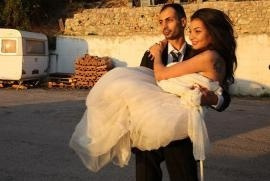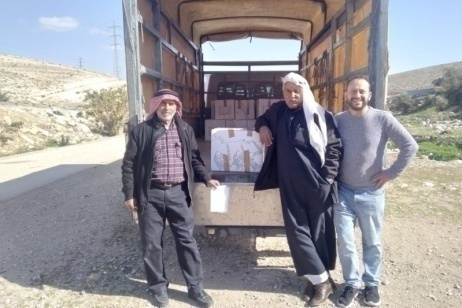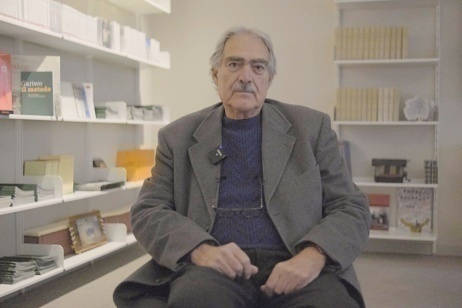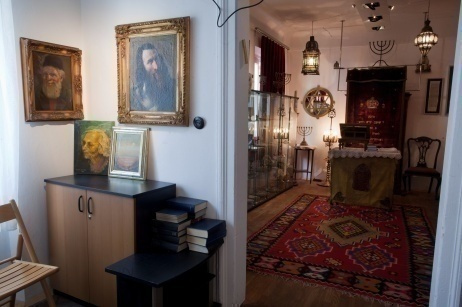On the bride’s side (Io sto con la sposa is the original title) was presented at the last edition of the Festival of Cinema in Venice in the section “Horizons” and in a few hours it became a sensation. 70,000 spectators in less than two months all over Italy, the presentation at IDFA (the festival of documentary in Amsterdam) and the acceptance and current screening at the International Festival of Documentary in Dubai, with thanks to a crowdfunding from thousands grassroot producers.
The movie follows the trip of a group of Syrian and Palestinian refugees debarked in Lampedusa and heading to Stockholm. An Italian journalist and a Palestinian-Syrian poet meet by chance in a bar in Milan offer to accompany the travelers in their trip across Europe. To avoid being arrested for smuggling, they decide to stage a faked wedding, complete with bride, Italian and Syrian guests thrown in by way of accompaniment.
Gabriele Del Grande, protagonist and author of the movie with Khaled Soliman Al Nassiry and Antonio Augugliaro, is also the creator of blog Fortress Europe, the observatory on immigration online since 2006 that has gathered documentation of the trips in the Mediterranean from 1988 until today, in which thousands people died in the attempt to reach our coasts.
You have been committed to the theme of migrants for many years, not only through your project Fortress Europe. How did you conjure up the idea of this blog?
To tell the truth it started nearly by chance from an article written in Summer 2005 in Rome. After my journalism classes, I cut my teeth in a press agency to which I had suggested an article to try and clarify the deaths in the Mediterranean. Writing that piece I realized that the death toll was huge and nobody was aware of it. I started putting the data together in an archive that I put online in January 2006. At the beginning the blog was mostly filled in with digits, with a long list of shipwrecks documented in the press and some statistics, and it was simply a way to share on the Web the information that I had found while working at that article. From digit I passed to people, interviews and, in October 2006, I left my job to under take my first three-month trip across the Mediterranean to gather the stories of travelers. Those meeting made me feel the importance of this job and gave me the strength to go on in these eight years.
You wrote on your blog that almost 21,439 have died since 1998 while trying to enter the European “fortress”. What can be done to prevent these tragedies with such a heavy death toll?
We can act on different levels. Migrations are a natural phenomenon in the history of humanity, but we should step into the war scenes – in countries such as Syria, Lybia, ragaved by conflicts that involve Europe, too. We must work at the political level for international justice and conflict resolution. On the other hand, there is the big problem of mobility, and of how to welcome thousands people, the majority of whom is excluded from the visa procedures. Most of the times our embassies do not concede visas for lack of requisites and it has become nearly impossible to obtain a Schengen visa for the citizens of the Arab and African country where people start from to reach Lampedusa. So, those who remain outside this turn of visas relies on smuggling; the frontier is actually open, it is difficult to cross it legally, therefore people do illegality. To address the tragedy of deaths in the sea, Europe should ask itself how to legally move the 100,000 people who cross the Mediterranean every year. There is a way of doing so and it is called free circulation. If we want to adopt a gradual approach, it would suffice to simplify the visa regulations, making them more flexible and easier. I strongly believe in a great liberalization of mobility, i. e. letting the job market, instead of public aid, decide those who enter and those who leave. I love thinking of a world in which those who choose to stop in Italy do so because they know they can find a job that can give them dignity and ensure them future perspectives. In Italy there are 5 million immigrants and every year thousands people get to Lampedusa without any documents nor any opportunity whatsoever but to try to demand political asylum. Some of them are refugees, many are Syrians or Eritreans, others are simply jobskeekers who are compelled to stay in a limbo for a long time waiting for documents that as usual don’t come. Thousands of them thus end up joining illegality in the difficult neighborhoods of Italian bigger towns, and they become workforce for the organized crime or are exploited a sit happens in Rosarno. We must simplify entry procedures so that those who want to go to Germany go to the German embassy and not to Lampedusa where they are subject to smugglers. In a world made smaller by globalization, this should be the standard. We need a big political investment, as already done with Europe, to have free circulation also in the Mediterranean. We must invest in peace, wellbeing and culture across this sea, but unfortunately things go the opposite direction: people are pushed back, find barriers and are often sent back to war scenes.
“On the bride’s side”, the documentary you shot with Antonio Augugliaro and Khaled Soliman Al Nassiry, is entitled in such a way that seems like a declaration of your intentions… What is the message that you wanted to convey through this movie?
Choosing sides. History is full of situations in which we must choose between the law of humanity and the laws of society. This conflict is a sold as human history, and it compels us to decide: abide of what is legal or what is legitimate? Taking the bride’s side to us was about choosing to disobey law, taking charge of the risks of a criminal charged, of being reported and tried to do all what is the right thing to us still today. And we did not repent, on the contrary we would do it again thousand times. We are enthusiastic about the fact that so many people are supporting us – we had more than 70,000 cinemagoers – and we are ahead still many weeks of broadcasting. There is a whole part of Italy who believes there must be a community of people ready to help each other under the direst circumstances.
You spent a long time in Syria after the outbreak of war. Which kind of situation did you leave behind? How was the resistance against Assad’s regime organized and what is left today?
Out of the activists who organized demonstrations in 2011 no one is left. Some were murdered, others jailed, others still have fled. The people I know have been dispersed in the Syrian diaspora. Half of the population, nearly 10 million people, have left the country. Today the people who remain there are emergency operators such as medics, nurses, and teachers. In this sense we witness the survival of a kind of activism made by volunteers who remained in such ravaged cities as Aleppo to ensure healthcare and teaching in the few schools that are still there. But the only voice is that of weapons. At the beginning the conflict was experienced as a liberation war against the Assad regime, but nothing is left of that atmosphere. Money and weapons arrived from external funders, such as Saudi Arabia and Qatar, with interests in Syria and the Middle East. Actually Al Qaeda and ISL militias are given free hands because they represented the ideal enemy, useful for the regime to regain credibility at the international level. To sum up, Syria is now a cancrene, a place with many warlords – among who Assad is the strongest at the moment – where everybody fights against everybody else and no force is able to re-establish a minimum set of freedom and democracy. After three years of war Syria does not exist any longer. Only two years ago nobody left the country to come to Europe because everybody believed the conflict would end in one month or two. Ove the past year, instead, 50,000 Syrians arrived at Lampedusa – a minority in proportion to the 10 million people on the move – who do not want their children to grow up amidst hatred, violence and sectarianism. It is a very sad situation, partly caused by the inertia of Europe, that we could have avoided thanks to more widespread an awareness.






